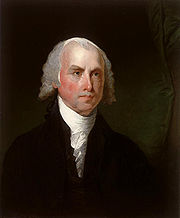
Federalist No. 57
Encyclopedia

James Madison
James Madison, Jr. was an American statesman and political theorist. He was the fourth President of the United States and is hailed as the “Father of the Constitution” for being the primary author of the United States Constitution and at first an opponent of, and then a key author of the United...
, the fifty-seventh of the Federalist Papers
Federalist Papers
The Federalist Papers are a series of 85 articles or essays promoting the ratification of the United States Constitution. Seventy-seven of the essays were published serially in The Independent Journal and The New York Packet between October 1787 and August 1788...
. It was published on February 19, 1788 under the pseudonym
Pseudonym
A pseudonym is a name that a person assumes for a particular purpose and that differs from his or her original orthonym...
Publius, the name under which all the Federalist Papers were published. It is titled, "The Alleged Tendency of the New Plan to Elevate the Few at the Expense of the Many."
Madison advocates the election of "men who possess most wisdom to discern, and ... pursue, the common good of the society."
According to the essay, the representatives will be true to their constituents for the following reasons: 1) the people chose these distinguished men to uphold their engagements, so the representatives have an obligation to stand by their words. 2) The representatives sense a mark of honor and gratitude feel at least the tiniest affection to these constituents. 3) Selfish motives of the human nature bind the representative to his constituents because the delegates hope to seek advancement from his followers rather than the government. 4) Also, frequent elections remind the representatives that they are dependent on the constituents for their loyalty and support. Therefore, the representatives are compelled to remain faithful to their constituents. 5.) The laws created by the legislators will apply to all members of society, including the legislators themselves.

